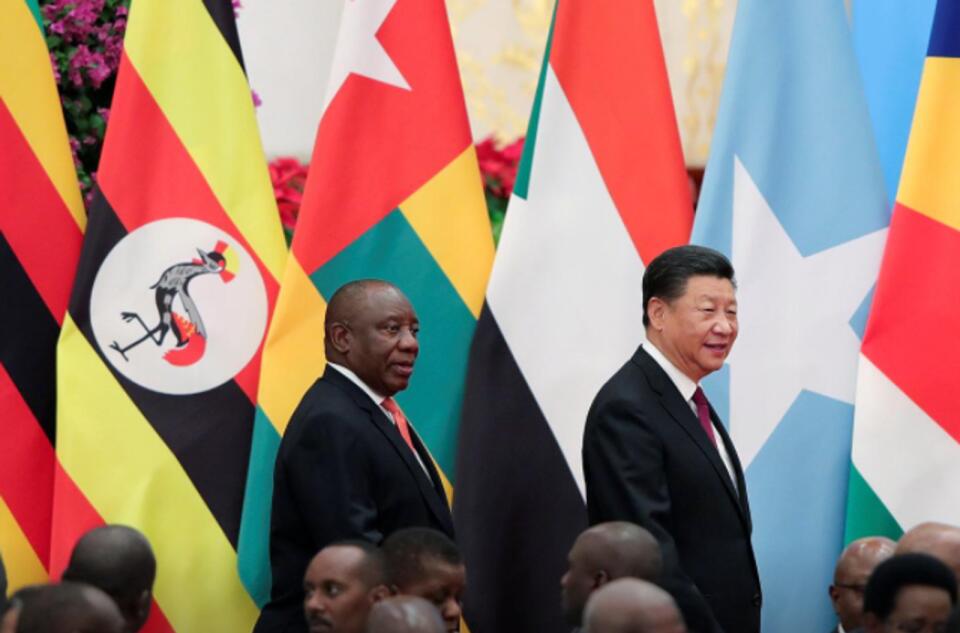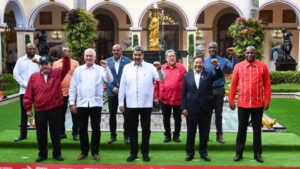South African President Ramaphosa and Chinese President Xi Jinping seen at an African trade conference. The South Africa-China Job Fair that starts today, April 16, 2024, aims to contribute to the South African government’s efforts in combating unemployment, the writer says. – Picture: SA_China
By David Monyae
In his State of the Nation Address on February 8, 2024, President Cyril Ramaphosa, underscoring the importance of creating job opportunities for South Africa’s young generation, remarked that “Having a job does not only provide an income – it is fundamental to people’s sense of self-worth, dignity, hope, purpose and inclusion.”
The upcoming South Africa-China Job Fair aims to contribute to the South African government’s efforts in combating unemployment. On April 16, the South Africa-China Economic and Trade Association (SACETA) in collaboration with the Chinese embassy will hold the third instalment of the Job Fair.
The last Fair in 2022, attracted over 100 Chinese-invested enterprises and 1,300 participants. Chinese enterprises, which operate in various sectors of the South African economy, pledged to create 20,000 jobs for South Africa in the following three years.
SACETA is one of the bilateral mechanisms falling under the auspices of the China-South Africa Bi-National Commission (BNC) and the Joint Economic and Trade Committee (JETC) through which the two countries work together to expand their already thriving economic relations.
The 2024 Job Fair is expected to attract over 60 Chinese-invested enterprises operating in various sectors namely finance, technology, energy, and transport among others. The enterprises will be recruiting qualified job seekers at the event as part of the efforts to alleviate the high levels of unemployment with which South Africa is currently struggling.
According to a 2023 report by Statistics South Africa (Stats SA), the country’s unemployment rate stands at an alarming 32 percent with 3.2 million more working-age people outside the labour market having given up searching for jobs. As such, the Job Fair offers young South Africans an opportunity to market their skills directly to Chinese companies in South Africa.
This is in line with South Africa’s National Development (NDP) Vision 2030 which seeks to reduce the scourge of unemployment affecting mainly the youth. The 2024 Job Fair is the first since South Africa-China relations entered their Golden Era last year ushered by Presidents Xi Jinping and Cyril Ramaphosa during President Xi’s state visit to South Africa last August.
Together, declared their intention to build a high-level China-South Africa community with a shared future anchored on mutual trust, common prosperity, intensified people-to-people relations and the pursuit of a just and equitable global order. Events such as the Job Fair will play a crucial role in turning the vision of a community with a shared future into reality.
The two countries have enjoyed successful economic cooperation since the inception of official diplomatic relations in 1998. China has been South Africa’s largest trading partner for the past 15 years while South Africa is China’s largest African trade partner accounting for almost 20 percent of China’s entire trade with Africa. In 2022, trade between South Africa and China reached a record US$57 billion which is a reflection of the two countries’ compatible trade policies and the effectiveness of bilateral platforms such as the JETC and the SACETA in expediting trade flow.
China receives almost 10 percent of South African exports while being the source of 20 percent of its imports. In terms of investments, China has also become one of the major sources of foreign direct investment for South Africa. South Africa is the largest recipient of Chinese FDI in Africa hosting more than 170 major Chinese enterprises across the mining, energy, automobile, agriculture, telecommunications, finance and media sectors. According to China’s Ministry of Commerce (MOFCOM), China’s cumulative investments in South Africa exceeds US$10 billion.
China-Africa Research Initiative (CARI) reports that between 2014 and 2022 China’s FDI inflow to South Africa averaged around US$430 million annually. These investments have created hundreds of thousands of jobs for young South Africans and thus helped fight poverty and unemployment while aiding the country’s post-apartheid socio-economic transformation efforts.
Among the biggest Chinese investments in South Africa include the Industrial and Commercial Bank of China’s purchasing of 20 percent of the assets and earnings of Standard Bank South Africa worth US$5.4 billion, Hisense’s building of an industrial park in 2013, which now employs over 1,000 people, and the US$227 million acquisition of 45 percent stake at WeSizwe Platinum by the Jinchuan Group, which also helped raise US$659 million to expand WeSizwe’s operations thus creating more employment.
However, even though Chinese investment in South Africa has been on a growth path, it is still a tiny percentage of China’s total outbound overseas investment. Hence, there is need for the two countries to work on building more mechanisms to facilitate and grow Chinese investment in South Africa.
The South African government should ensure a conducive environment – including strong public infrastructure, a stable macro-economic environment and social cohesion – to attract more Chinese investments that would further multiply job opportunities for South African citizens.
Moreover, it is imperative for South Africa to build a skills base that matches requirements of Chinese investors. This would go a long way in making mechanisms like the Job Fair even more effective and impactful.
David Monyae is an Associate Professor and the Director of the Centre for Africa-China Studies at the University of Johannesburg




